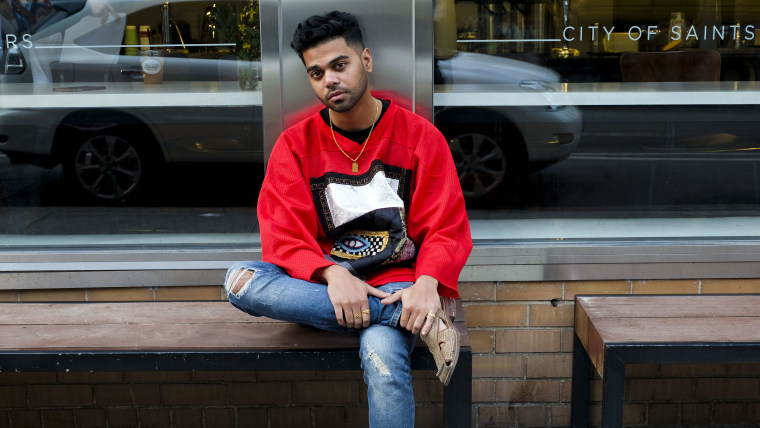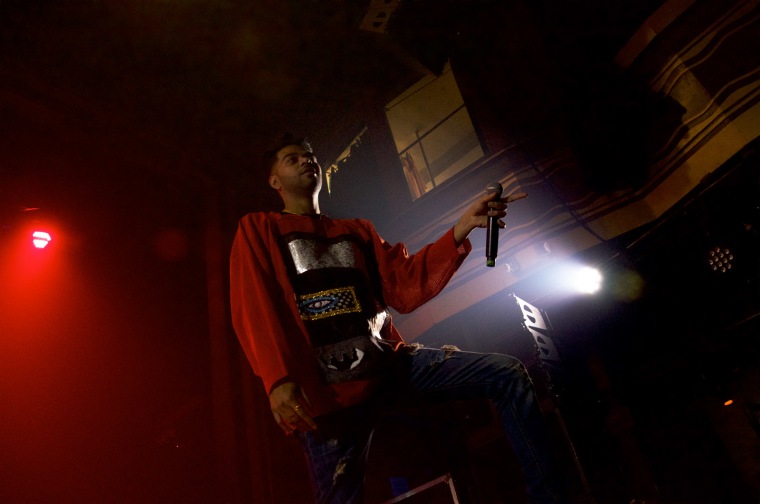When Anik Khan was 4 years old, his father moved the family from Bangladesh to Queens, New York, giving up his higher education and large house to give his children the chance to pursue greater opportunity.
Khan used that opportunity to become a rapper. His parents weren’t thrilled.
“You can’t tell me I’m not a part of this. When it comes to hip-hop history and when it comes to being from the hood, I understand the ins and outs. That’s what I am. That’s what I know.”
“It doesn’t matter if you’re an immigrant or not, no f**king parent leaves everything to come here to have nothing to have your kid tell you, ‘I’m going to be a rapper,’” Khan told NBC News. “But then when we realized that I can actually make a living out of this, and I’m really doing something for people, and it’s really working out, they were like, ‘We support you. We love you.’”
Khan is using hip-hop to share his ideas, values, and culture. His songs are full of references to the way things are in the diverse community of Queens, where Khan said he grew up with black, Latino, and West Indian neighbors.
“I realized I can’t run away from being Bengali,” the 28-year-old said. “So how can I take things from my culture and mix it with the things that I love here? And not just my culture, but the cultures that I grew up with in Queens in general?”
“It’s not just Bengali sounds that are in my music,” he added. “There’s West Indian, West African, Brazilian. There’s timbres of Bosnia in my stuff because I just got lucky and grew up in the most diverse place in the entire world.”

Khan released his debut EP, “I Don’t Know Yet,” in 2015 and the continued his momentum with the release of singles “Obsession,” “Too Late Now,” and "Renegade."
Now, he’s gearing up for his new project, “Kites,” which is scheduled to release on April 28. It is a collection of songs that are meant to show everyone outside the Big Apple who Khan is as a rapper.
“It’s less about the immigrant story,” he said. “This project is about myself. It’s about a young guy who’s chasing a dream in his late 20s, figuring his [stuff] out.”
Khan didn’t grow up in luxury. He and the five other members of his family lived in a one-bedroom apartment in Astoria. His dad drove a taxi.
But despite the family’s modest means, Khan was constantly surrounded by music, from classical Bengali songs to the West Indian music that his sister would bring home. He said he got into hip-hop more during middle school with friends but was really introduced to it when he picked up DMX’s “It’s Dark and Hell is Hot”on cassette for 50 cents at the local Bengali deli while in elementary school.
“I’d carry my Walkman everywhere, and boom, it was just instant. It was like a chemical reaction. I instantly went in, and I was like, ‘Oh my god. I love this shit,’” Khan said.
The appreciation turned into something he could actually do when he danced at Bengali community events, which Khan attended with his family.
“But then when we realized that I can actually make a living out of this, and I’m really doing something for people, and it’s really working out, they were like, ‘We support you. We love you.’”
“They would play the biggest Bollywood hit, and I would dance,” he said. “At 9 years old, I would be bouncing my shoulders until that turned into, I think subconsciously that always made me want to entertain people. When somebody told me that I was good, I was like, ‘Alright, let me try this out.’ I wrote my first rap when I was 14 or 15.”
Khan draws parallels between the communities that hip-hop grew out of and the one he grew up in.
“No one ever told me, ‘You’re not black enough’ or [anything] like that because that culture has always been a part of me,” he said. “All of my best friends are black. If you look up any pictures or any videos of my homies onstage, I’m the one brown guy.”
“You can’t tell me I’m not a part of this,” he added. “When it comes to hip-hop history and when it comes to being from the hood, I understand the ins and outs. That’s what I am. That’s what I know.”
Khan doesn’t shy away from who he is and wants to make his culture a real part of America’s melting pot. In one of his latest singles, “Habibi,” he focuses on the Arabic word, which translates to “beloved” and is used to describe friends and loved ones.
“That’s something I wanted to put out there because I grew up in New York where black folks know about the ‘habibi,’” he said. “You go into the deli and go ‘Yo what up, habibi. Let me get a jerk turkey.’ You know what I mean? And that’s amazing to me because you’re not going to find that anywhere else besides here.”
Follow NBC Asian America on Facebook, Twitter, Instagram and Tumblr.
